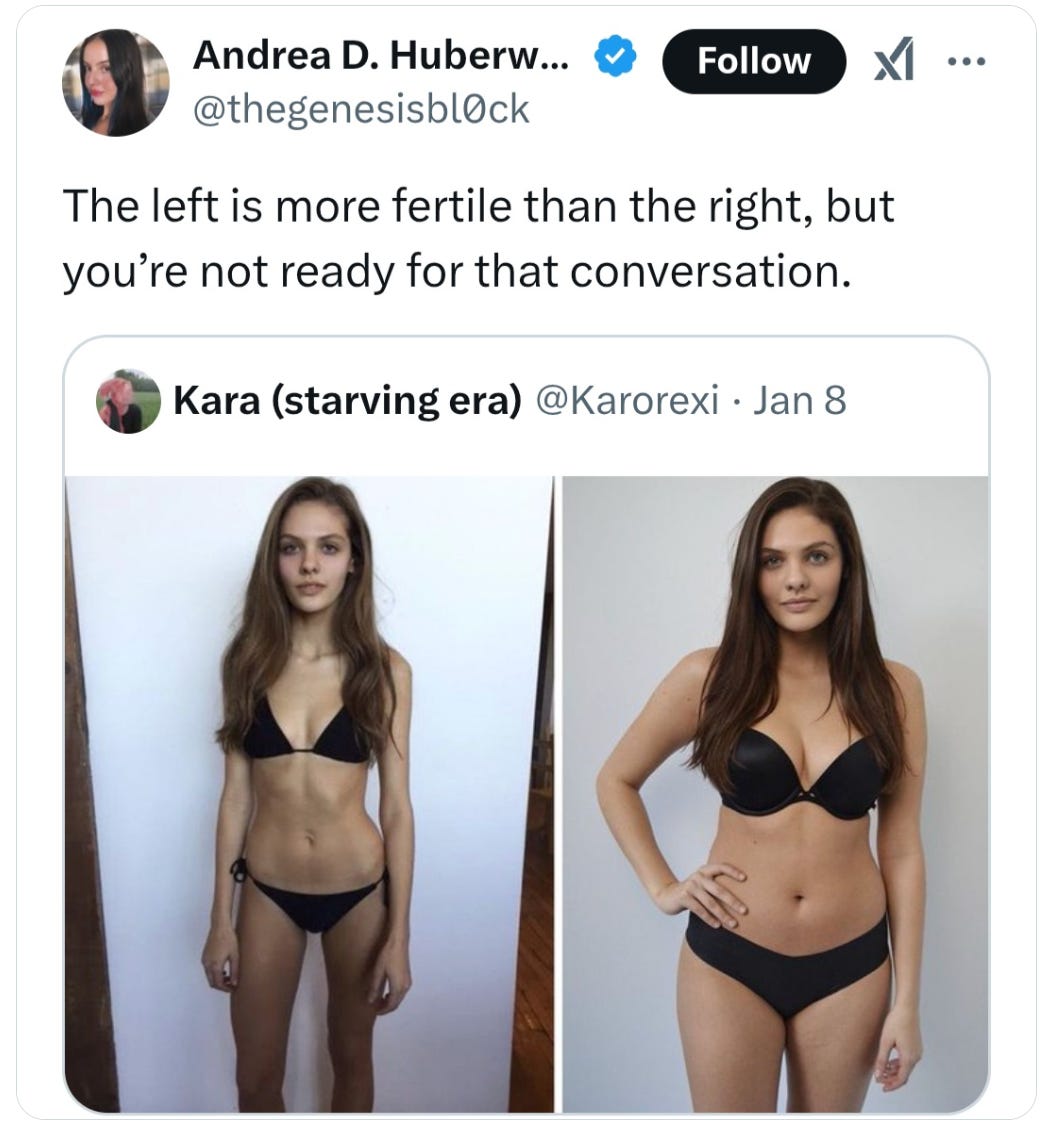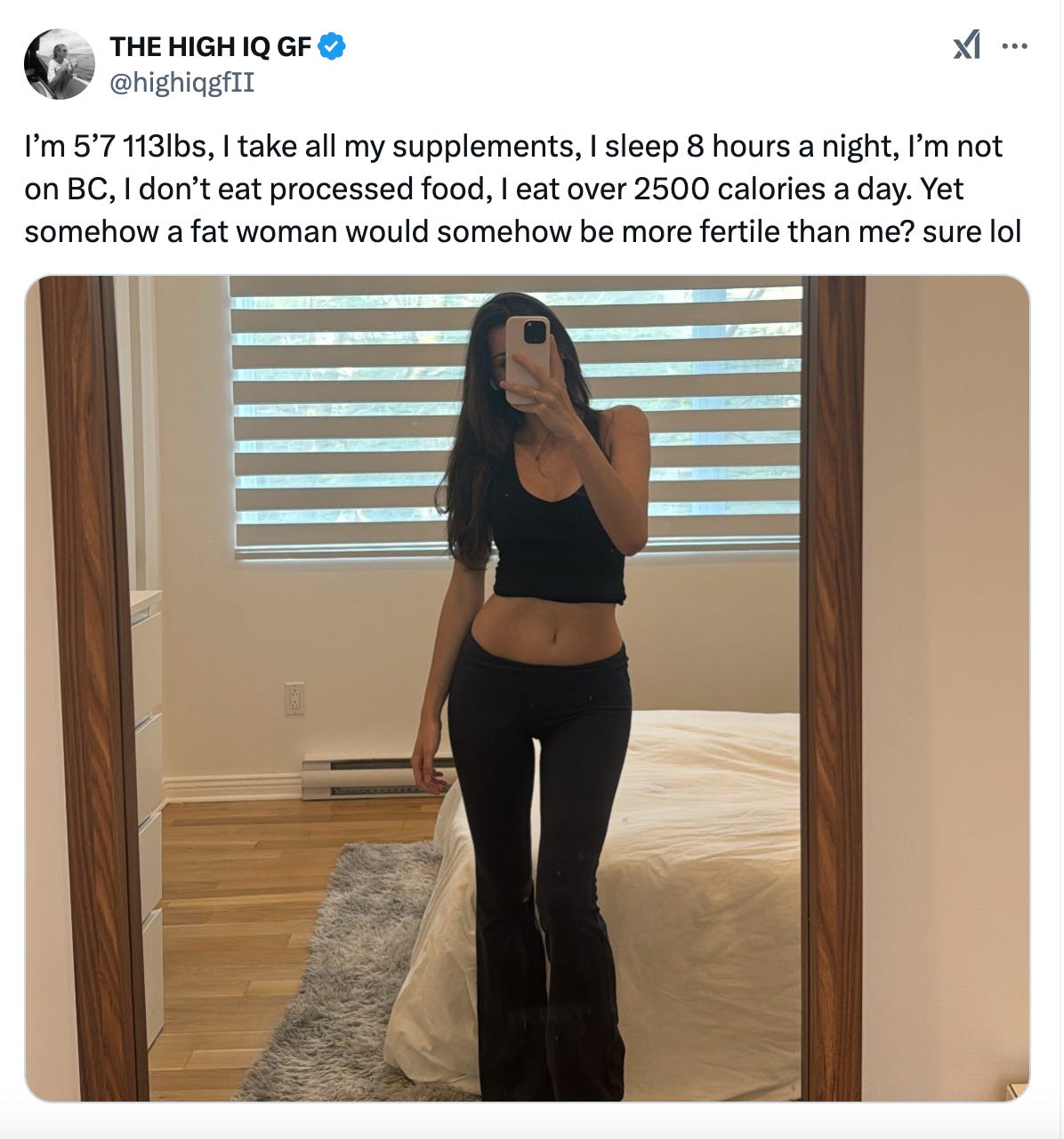There’s been concern, as of late, in intrasexual competition. The idea is that the stock of worthwhile partners is low, and we must compete amongst each other for the available lot. It’s most often discussed as battle between women, whose methods of intrasexual competition are apparently more subtle. Those girls telling their friend with hair that grazes her lower back to cut it into a bob? They’re lying — they really just want her to become less attractive, so that they themselves might be more appealing in comparison. Or so the theory goes.
It is, obviously, a rather trite observation, one that assumes everything women do is in an effort to yield male attention. But there are times in which the theory has some foundation. Recently, for example, some women online have been posting about how “fertile” they are in comparison to other women. These women do not appear to have children, nor have they discussed ever being pregnant. In their minds, fertility is dictated primarily by their aesthetic qualities, namely thinness. They tout their healthy diets, supplement regime and workout schedules as indicative of their ability to reproduce, without much substantiation.
Women posting like this does suggest they view compatible, “high value” men as a scarcity, so much so that they need to skip past all their other qualities as women and get down to what really matters: the potentials of their womb. Men are indeed generally attracted to fertility, even if they have absolutely zero interest in reproducing in the near future. It’s part of the hardwiring of being human. Many of the things we do to make ourselves attractive to each other, men and women alike, are ultimately methods of enhancing our perceived, aesthetic fertility: clear skin, large breasts, bodily strength. We are often — but not exclusively — trying to appear to be desirable future mates.
It isn’t as though it’s bad that women want to advertise themselves as willing and able to get pregnant. I’m of the opinion that it’s good for people to want to become parents. But I’m unsure whether this scrutinizing over fertility and which body type is most conducive to it is actually productive toward that goal. After all, one of the original posts sparking the debate was how a woman who gained weight was “more fertile” prior to doing so, when she had actually become so thin that she had lost her period and was therefore infertile. The purpose of these ragebait posts is to increase engagement and spark a debate, which maybe in turn puts baby-making on everyone’s brains. The more likely result, however, is that it further jades women toward the prospect. It makes motherhood an ever-more daunting task: all the demands of parenting are expected by these types to be completed while rail-thin and subject to the scrutiny of strangers.
What is the prize here for women who participate in this? On an abstract level they are likely indeed searching for a partner with whom they could reproduce, but on an immediate level they are looking for attention. They want attention both from men who might find them sexually appealing, but also the negative attention that comes from posting something inflammatory. Maybe at the end of the day all they really want is Elon bux.
Beyond the sexual competition of it all, women do seem increasingly concerned about their fertility. For obvious reasons, we associate our ability to have children — whether or not we even choose to do so — with our overall health and vitality. I don’t think this instinct is misplaced, regardless of whether it is perfectly correct. There are plenty of women in otherwise ideal health who are unable to conceive. This is part of why, in addition to the sense of loss of future, infertility is such a blow to the sense of self. It is viewed as a bodily failure, a feeling of being inert.
Fertility, however, has always been prized — just look to the Stone Age Venus totems of 30,000 years ago. Today’s scholars argue that such totems were symbols of survival, rather than sex. I’d argue that there’s little difference, particularly from an early humanity perspective, but nevertheless the point stands. Viewing fertility as something both precious and precarious, worth worshipping even, is not new. But for much of modern history, the concern with fertility had also been controlling it, lessening it. There was a struggle to make oneself temporarily infertile and mitigate the possibility of becoming pregnant. Thousands of years of crude birth control methods, from animal intestine condoms to herbal oral contraceptives, highlight the legacy of this task. The options available to women over the last several decades have carried a far greater rate of success and with it, security. Not getting pregnant is no longer widely a matter of luck among women in the United States: hormonal birth control pills, IUDs and implants are over 99 percent effective in preventing pregnancy with perfect use, the latter two being as effective with typical use, as well. All of this seems important to highlight in the context of the fertility olympics women are putting themselves through now. It is what separates it from the fertility veneration of centuries passed.
We’ve had these nearly perfect birth control options for the last several decades, though. So why now are we seeing this “I’m more fertile than you” rhetoric? This newfound obsession is perhaps the obvious conclusion of this reality. We have all but mastered the art of not getting pregnant in the United States, including among vulnerable populations like teenagers. That’s part of why the birth rate has declined — we are fortunately no longer facing the epidemic of teen moms that we did in the early 2000s. Now that we have a concrete option of becoming infertile on a month-to-month basis or longer, it’s the opposite now that feels abstract.
As The Washington Post published in March 2024, women are increasingly getting off birth control in a “misinformation explosion” they’ve labelled as a sort of conservative psyop to control women’s bodies and coerce them into motherhood. That’s part of it, I’m sure, but there are genuine (albeit rare) health risks and broader criticisms to be dissected of birth control. Just twenty years ago, a woman wanting to be more “in tune” with her cycle and getting off birth control to do so is precisely the type of hippie-dippie behavior that probably would have made her a liberal. Now, she might be considered a conservative. Either way, we know nothing of this hypothetical woman except her period. All this is yet another example of how frequently our bodies and the decisions we make surrounding them are used as political tools. Embracing fertility is right-wing coded; taking birth control and not having children is left-wing coded. Whatever we choose, the decision is never quite our own. It’s no wonder the topic is tinged with such nervousness.
This anxiety isn’t relegated to women alone. Another component to all this that feels particularly contemporary is mens’ concerns over their sperm count and virility. While women are bombarded with advertisements for various birth controls, men experience something of the opposite. A sea of new direct-to-consumer pharma tech companies push men of all ages to consult with online doctors to prescribe them medications that promise to help them achieve erections more quickly and for longer. Their Instagram Reels feeds are filled with health influencers warning them that their sperm counts are declining because their polyester underwear are too tight, their protein powder has too much plastic, their phones are radiating their balls. Everywhere, the message to men is that their potency is waning. It has little to do with their future potential for fatherhood, but rather is entirely centered on selling them a concept of how to be a man. It doesn’t matter whether they’re having children or not — struggling to maintain an erection or having a low sperm count makes them less of one. And while there is indeed something rotten behind the causes of those problems, many are merely being sold superficial solutions.
Underlying all this is the likelihood that nobody is really having much sex, regardless. What do we do with all this fertility anxiety and debate if the fertility itself is not even largely being acted upon? Birth rates continue to fall year over year since 2007. Last year, it fell another three percent. It’s not like people are just suddenly really good at pulling out. In reality, a good portion of them are just simply not having sex at all. So, again, what is this display of fertility olympics really even for?
As with so much of our self-perception and self-expression, it’s all for political, parasocial show. By emphasizing their fertility and offering up the stats to quantify it — here’s how many calories I eat in a day, here’s how often I work out, here’s what supplements I take — those who engage in this competition are flattening their bodily capabilities into a product for digital consumption. It is fertility for the isolated, online era. No need for actual sex, pregnancy and childbirth: the female body is purely a place of imagined possibility, always the empty vessel. This current veneration of fertility is driven by neither the need for survival nor sex. It has become abstract from both.
Beneath all of this, though, there is a hint of something real. A true tension is revealed, a fear. What are our bodies for? Are we in control of them? What have all these mediations done? And will anyone still want us even if we never know?








Maggie, remember that 1975 novel " Fear of Flying" by Erica Jong, about a woman ♀️👠 s sexual awakening? We used to 🤣 joke it should have been titled "Fear 😮 of Not Fucking?", by Erica Dong. Am I Satan ?? 📱
You overestimate the power of the media. No man needs the media to tell him that losing the ability to have an erection is a sign of him being less of a man. Men are very well in tune with their sexual abilities. Losing the ability to perform a bodily function that is central to his identity is certain to invoke an instinctual sense of loss. No propaganda required.
Similarly, if conservative psyops had any power at all to make an impact on women's behavior, churches would be overflowing with congregants on Sunday, not hemorrhaging members as they are today